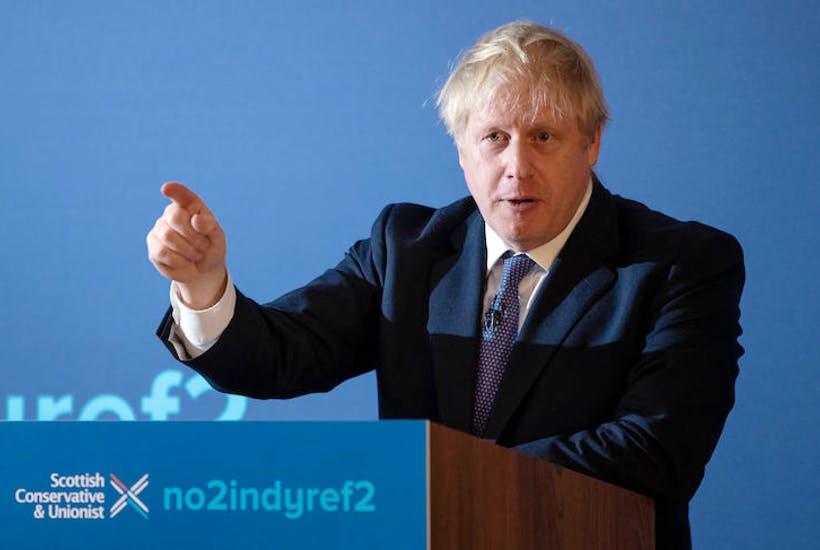The Scottish papers carry two difficult polls for Downing Street. One, from Survation, puts support for independence at 50/50; another, from Panelbase, has it at 52 per cent in favour and 48 per cent against. The cursed percentages.
I say difficult polls for Downing Street rather than Westminster in general because the Union — not Brexit, or terrorism, or northern regeneration — is the number one challenge facing Boris Johnson’s government. I appreciate that I banged on about this as recently as Friday but I intend to keep banging on about it because a) it’s true, and b) I cannot bring myself to care about Nish Kumar.
The Prime Minister’s refusal of a Section 30 order — the legal mechanism which would allow the Scottish parliament to hold another referendum — was the right call. It is also good to hear talk about ‘love-bombing’ Scotland and hosing us down with more cash, not because this is sufficient to see off the separatist threat, but because it’s a start. Finally, it’s reassuring that Michael Gove is the de facto Secretary of State for Keeping Scotland in the Union because he understands Scotland, isn’t afraid of the SNP and realises it’s going to take more than sticking a few Union Jacks on government-funded projects north of the border.
The Prime Minister has checked Sturgeon, but he has not checkmated her. Stopping another referendum for now does not stop sympathy growing for Scexit — Scotland’s exit from the United Kingdom – but Europe has dozens of separatist movements and their respective states manage just fine. Even those movements with large-scale popular support can be frustrated by central government with limited practical consequences, as Spain has shown with Catalonia.
But the UK, unlike Spain, is not an indissoluble unitary state and the Union would struggle to survive long-term if there is intergenerational backing for Scexit. This is especially the case since Tony Blair’s greatest mistake — devolution — established a politically legitimate rival to Westminster, through which support for independence can be expressed. You can’t keep people in a Union they don’t want to be in.
These latest polls follow one on Friday, which also showed a narrow lead for Scexit over Remain. Terribly outré to quote oneself, I know, but this is the point I tried to thump home on Friday:
‘I don’t recommend that the Prime Minister panic over one poll. I recommend that he and his Government show some indication that they appreciate the nature and scope of the threat they face. This threat requires political, economic, cultural and institutional responses. It will not simply go away by pretending it isn’t there. Nor will buying off the Nationalists with more powers for Holyrood in fact buy them off. There is no third way here. The SNP wants independence and will continue to use Holyrood to gain it by stages until it can make it official in a referendum. The Prime Minister either has to reconcile himself to that eventuality or he has to grasp the thistle and reform Blair-Cameron devolution to reassert the primacy of Westminster and curtail the devolution creep that daily saps at UK sovereignty.Scotland is not some distant dominion whose departure would change little. The sound of that door slamming would be heard most keenly not in Whitehall but in Cardiff and one half of Belfast. The Prime Minister is a student of history; he knows how ever-weakening union ends. He knows too that a prime minister’s legacy is set by the first line of his obituary. If he doesn’t start taking sovereignty seriously, his will begin: “Boris Johnson, the man who won an election and lost a country”.’
So, how does Boris avoid this fate? That’s a much longer piece but there is space for some notes. First, don’t panic. Prepare for a long bout of bad polls on the independence question and, if that’s what we’re in for, don’t rush to precipitous action. Madrid had to live with two solid years of Catalan statehood leading in every single poll between 2011 and 2013 followed by a wildcat referendum in which the separatists won 92 per cent of the vote. UK ministers don’t know they’re born.
Next, show strength. Don’t take fright and try to make it all go away by handing more powers to Holyrood, as David Cameron did (twice). The Nationalists smelled weakness and were emboldened by it. There are commentators, opponents and even Tories who will tell the PM that he must concede a referendum if the SNP wins a majority of seats in next year’s Holyrood election. It’s a trap and a trap that could earn Boris the aforementioned obituary. The SNP has been using the house Labour built it to undermine the Union for 13 years; the rebuild is going to take some time. The constitution is reserved. No mandate on reserved matters is achievable at a Holyrood election. Just. Say. No.
Beyond this lies the hard work of deLondonising the state (shifting public agencies and even government departments to Scotland, Wales and the North), putting the Union at the heart of government (turning the Scotland and Wales Offices into super-ministries with expanded remits and resources to carry out reserved responsibilities with sensitivity to discrete politics), and reforming the devolution settlement legislatively to establish clearer parameters and curb the drift to Scexit (and Cymrexit). I’m afraid I’m going to keep banging on about this because the Union underpins everything else. A country succumbing to ever-weakening union — a country slowly falling apart — cannot make a success of Brexit or much else.







Comments